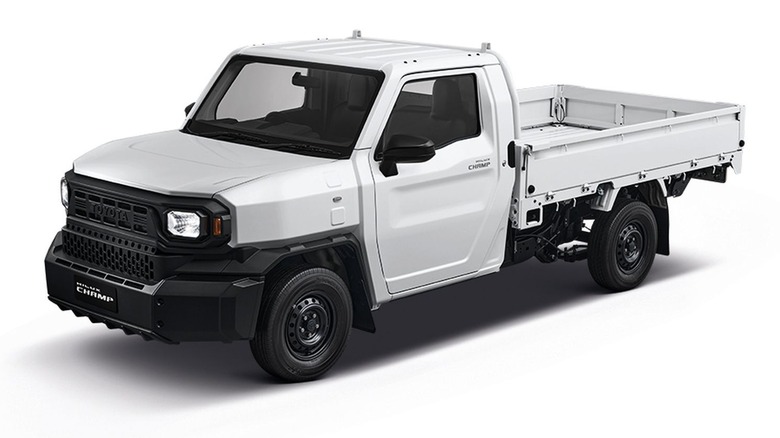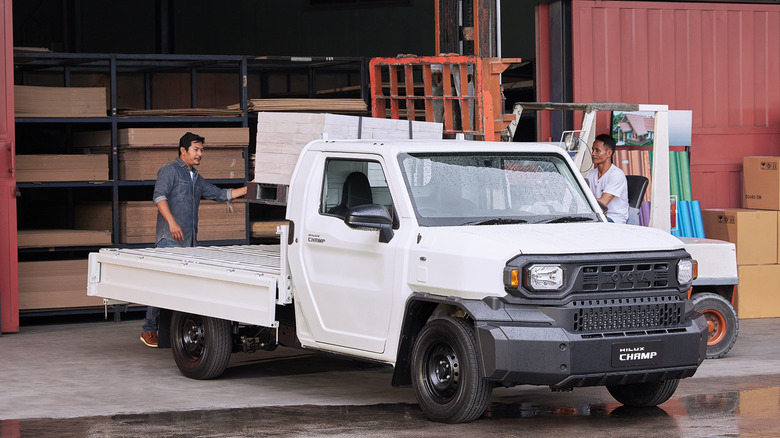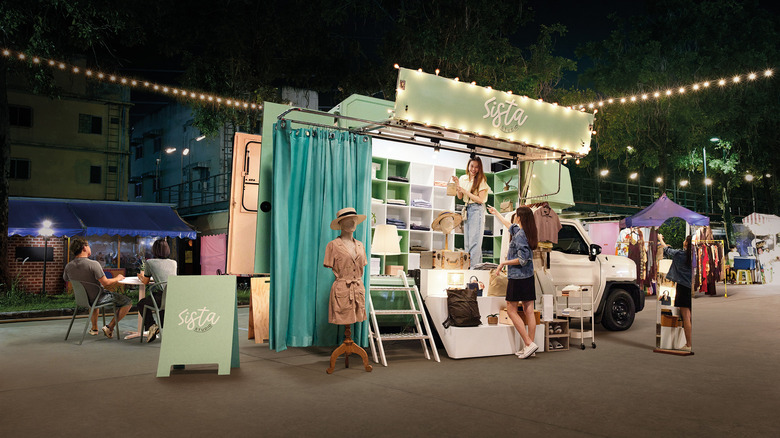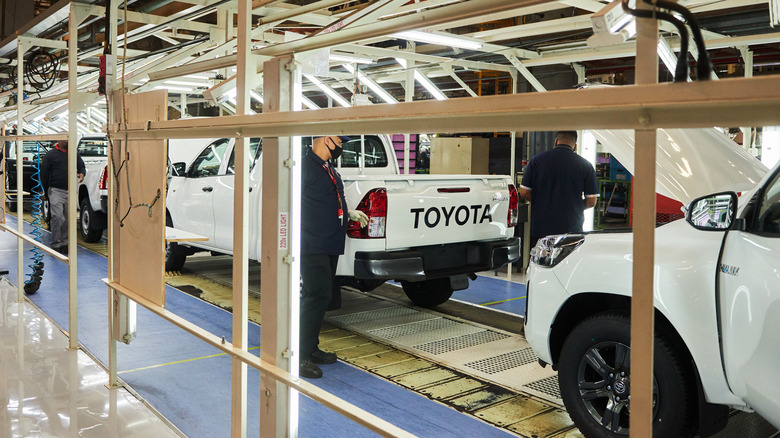Everything To Know About Toyota's $10,000 Pickup Truck
The Toyota IMV 0 is — like the "zero" in the name suggests — as basic as a vehicle gets. IMV stands for "Innovative International Multi-Purpose Vehicle," which means the first thing you'll need to know about this low-cost multi-purpose pickup is that it will not be coming to the United States. This is a strictly international mode of transportation meant to slide under the segment of the least-expensive Hilux: a truck that some 180+ countries not named Canada or the U.S. can snatch up at unheard of MSRP that's around half the cost of the cheapest truck currently in America (Ford's Maverick at $24,995).
In fact, the IMV 0 shares the same platform name as the indestructible Hilux truck and was designed specifically for Toyota's customers in Thailand. As such, it will be called the Hilux Champ in a country that is not only wild about its trucks but also close enough to the carmaker's headquarters in Japan that it's evolved into a truck development incubator for other Southeast Asian markets. In 2022, Toyota sold 145,435 (17% of its total sales) of the Hilux in Thailand alone.
Where the Hilux has recently ballooned north of a $15,000 price tag, Toyota claims it will return "to its origins to create an IMV pickup truck that is truly affordable and meets the needs of customers." The automaker has been talking with local people and having local Thai engineers lead development on the Hilux Champ as a result of this.
This no-frills Champ is designed to last
When it debuted at the Japan Mobility Show in Tokyo in October 2023, estimates tabbed a starting MSRP of $10,000. However, during a launch event the following month in Bangkok, 11 customized models were introduced with a starting price that had increased to just over $13,000. As part of its back-to-basics approach, cost optimization was vital, but so was building a truck that real-world users could upgrade with aftermarket add-ons based on their needs. Dr. Jurachart Jongusuk, the chief engineer for Toyota's Hilux-derived IMV platform, said it aimed to deliver the vehicle "at 70 percent finished, with the remaining 30 percent customized by the customer."
Toyota offers the IMV 0 in short and long-wheelbase versions, with the base configuration having rear-wheel drive. A gasoline 2.0-liter, inline-four engine is mated to a 5-speed manual transmission — with optional 2.7-liter gas or 2.4-liter diesel engines.
The Champ will be bereft of virtually any "comfort" features, lacking anti-lock brakes, airbags, or armrests. Windows are old-school crank, and plastic and rubber line the seats and floor. All the window glass will have flat glazing. The flat deck will come without sides but can be upgraded. Some HVAC controls sit under a spot for a radio, and the instrument "cluster" is basically "just a big blank circle." The basic model might best be compared to the barest of bones rental moving van in the United States. However, an array of options is available for nearly everything, which increases the cost exponentially.
Sell your wares where you'll be most successful
Thailand's Champ will be available in two versions, one with a flatbed (MT-AT) with short hinged sides and another that comes with just the truck cab and no bed at all (the MT), which is part and parcel of Toyota's claim "to make people's lives better through customizability." The unequipped flat deck includes bolt holes to let customers attach whatever they want to their Champ. Toyota Motor Thailand Co., Ltd. (TMT) claims that while the base model will be built at the Samrong Plant, it has more than 100 accessory manufacturers lined up to provide customers with an almost limitless number of customization options, including a mobile clothes store or some other type of open-air retailer, a food truck, or kit it out with an array of camping gear and equipment.
Considering how forward-thinking Toyota Motor Corporation (TMC) is as a whole, you may be asking, why not an electric version? Toyota's President Akio Toyoda addressed that at the 60th anniversary of TMT in Bangkok in December 2022. While the company is wholly committed to reducing emissions and achieving carbon neutrality goals, Toyoda doesn't think Battery Electric Vehicles (BEVs) are the only way to accomplish this. He added that everyone needs to be more realistic about how soon an actual global infrastructure can be created and supported.
Additionally, Toyoda said he'd "rather pursue every option, not just one — options such as emission-free synthetic fuels and hydrogen" because he feels hydrogen power is equally viable as BEVs. He backed this up by claiming he had recently driven a hydrogen-powered Toyota Yaris and was "blown away by its performance."
Inspecting, refining, and improving the work flow
As mentioned, Toyota allowed local Thai engineers to lead development on the Champ. This philosophy speaks to the tried and true Toyota Production System (TPS), which is based on thirteen core processes and philosophies (a.k.a., pillars) and is one of the big reasons why Toyotas are so reliable. From these, "Gemba" and "Genchi Genbutsu" might be familiar terms if you know anything about Lean Six Sigma, a methodology for improving process flow and eliminating waste on a manufacturing/production floor used in the United States.
Toyota's Genchi Genbutsu states that in order to truly understand a problem — and therefore know how to fix it — one can't rely on reports or numbers on a computer screen. One has to actually see the work being performed in the exact place where it takes place, and thus, managers are required to get out of their offices and down onto the production floor to observe operations firsthand. The term is less about physically being present than being fully aware of the entire production flow from top to bottom and pinpointing a problem and a solution.
By following this exacting methodology — one that has proven successful (and copied) the world over — Toyota felt everyone would benefit from having all the peoples of Asia contributing to their economy as a whole.



